(Above: Chanteuse Siri Vik sings The Seven Deadly Sins and other works by Kurt Weill and Bertolt Brecht at The Shedd; photos by Paul Carter)
(Correction: Pas de deux dance numbers in Set 2 were performed by Jim Ballard, Adam Kelly, and Sara Stockwell; Ballard’s name was inadvertently omitted in the original review.)
By Daniel Buckwalter
It’s the 1950s, and Kurt Julian Weill has died. His widow, Lotte Lenya, makes a pilgrimage to Europe and sees Bertolt Brecht, Weill’s collaborator (the hammer to Weill’s more velvet touch) throughout the ‘20s and ‘30s.
They talk. They reminisce. Finally, Brecht asks Lenya, a superb singer in her own right, to sing something, anything, for him. Lenya attempts to beg off, asking, in effect, how she could sing for such a great poet and lyricist.
But Brecht insists. “Anything you sing is epic enough for me.”
With that story told, the fearless and magnificent Siri Vik launched into “Surabaya-Johnny” from Weill’s and Brecht’s Happy End.
It was one of the many highlights in Vik’s and her ensemble’s skillful tribute to Weill and Brecht. The night was capped by The Seven Deadly Sins, featuring the ever-present all-male quartet that is Anna’s family, plus a 26-piece instrumental ensemble and five dancers, on Friday and Saturday nights before enthusiastic audiences at The Shedd’s Jaqua Concert Hall.
The smallish stage did not seem crowded or overworked. Dancers moved smartly to the choreography of Caitlin Christopher, and the singers (Vik and the quartet) had ample room. The instrumentalists, led by music director Robert Ashens, provided appropriately soft accompaniment to the vocalists.
The evening started with Set 1, a medley of Weill-and-Brecht classics, from Barbarasong to Canon Song, Jealosy Duet to Pimp’s Ballad, and a half-dozen more (although you will have to look up the correct German spellings).
Weill and Brecht were a wonderful professional pairing for the relative short time they were together, starting in the late 1920s to the premier of The Seven Deadly Sins (1933), their last major collaboration.
Brecht was swift and just as a lyricist, pouncing on the inequities of capitalism in satire. Weill, though partial to Brecht’s lyrical vision, saw the full stage art in all of its dimensions, perhaps including deadlines. Together, they composed enduring, professional, high-end pop music for their time.
This became especially true on Friday and Saturday nights in Set 2, the telling of The Seven Deadly Sins.
It’s the story of Anna 1 (Vik) and her alter ego, Anna 2 (ballerina Sara Stockwell of the Eugene Ballet Company). They are charged by their small-town Louisiana family (singers Cloud Pemble, Dylan Stasack, and Alex Mentzel, with a special nod to Bill Hulings in rather improbable drag as the mother) to hit the road with their talents in order to earn enough money to build the family a home on the banks of the Mississippi.
Together, Annas 1 and 2 crisscross the country for seven years, honing their skills in seven cities and gaining notoriety. Also, they experience all the seven deadly (and naked) sins of American capitalism — Sloth, Pride, Wrath, Gluttony, Lust, Greed, and Envy. They try to make sense of it all. They grow up.
Anna 2, the dancer, becomes more comfortable during the odyssey. She wants to dance on bigger stages and leave Louisiana behind. Anna 1, the more grounded of the two, keeps her eyes straight on the prize of the family house. It’s a morality play of ambition versus obligation.
Anna 1 wins out, though the story leaves me wondering at what cost. I found myself rooting for both women. Stories like this certainly still exist in America today.
Jim Ballard, Adam Kelly and Sarah Stockwell performed in two beautiful dance pas de deux in Set 2. One came during the “Lust” scene in Boston. In Saturday night’s performance, silence filled Jaqua Concert Hall, interrupted only by the wailing of a fire engine outside on High Street.
Inadvertent as it was, the siren offered the perfect backdrop to Anna’s seven-year, big-city odyssey away from small-town Louisiana. Anna 2, at least, was now finding peace in the big time.
Special mention also should go to dancers Kenady Conforth, Madeleine Sisson and Jim Ballard for their supporting, and fully believable, roles in the two-night performance.
Vik, though, clearly was the vehicle which drove the tribute to Weill and Brecht. As she noted in the run-up to the weekend, she had thought long and hard about how to put together The Seven Deadly Sins, long a goal of hers.
As artistic director of the show, Vik was able to cast a wide net and incorporate all elements of the original production.
She especially wanted the ballerina (Anna 2) involved. This is not always done because the financial cost is prohibitive for some, but Vik wanted to show the complexities of Anna 1 and Anna 2, growing up on the road, alone in harsh environments, burdened by the weight of family expectations.
Vik succeeded, and I hope she can continue this newer thread of her resume as artistic director. I have heard her perform at several venues — singing multiple genres — over the last decade. I am particularly fond of her work with classical composers, but she is well-versed in all facets of music.
Always armed with a strong voice and a winning stage presence, it has been a pleasure to see her mature on stage through the years. She always is worth the price of admission.
Vik is an educator, too. In keeping with her role as voice instructor at Lane Community College, she introduced each song in Set 1 by giving an easy-to-understand outline of where Weill and Brecht were in their personal and professional relationships at the time. This is an effective staple of Vik’s performances. Think of The Shedd as a large classroom with Vik as the knowledgeable lecturer.
As a Eugene native who has travelled her own roads across the country, honing her skills before resettling more than a decade ago in her home town, she remains a formidable talent.
When I think of Vik, I go back to the beginning and to Brecht’s answer to Lenya on that day long ago, each reminiscing about the operas and songs composed and performed. I can only repeat, “Anything you sing is epic enough for me.”
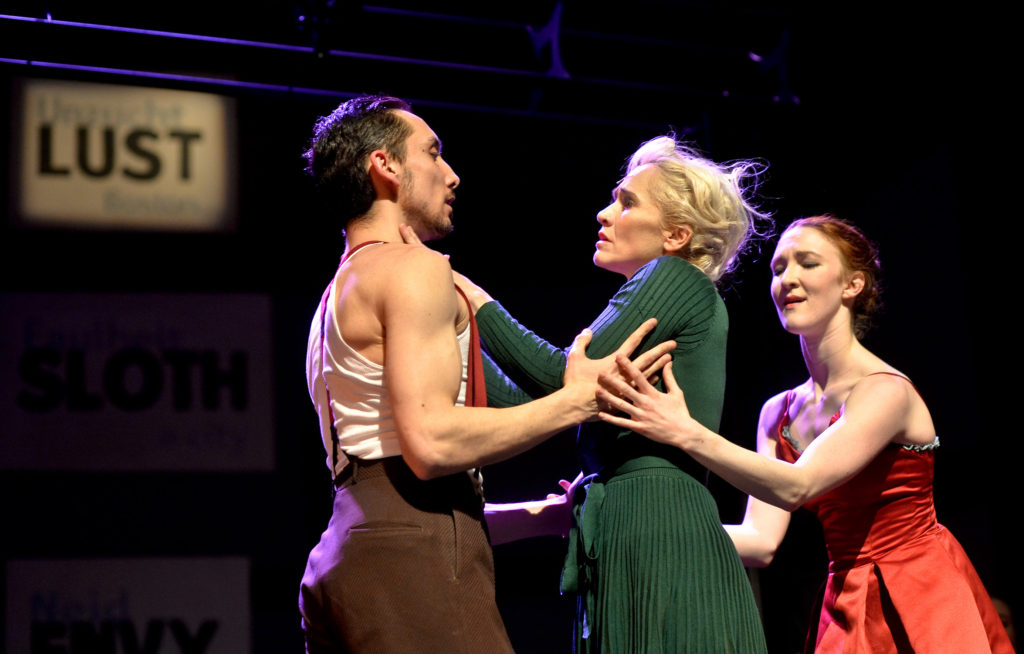

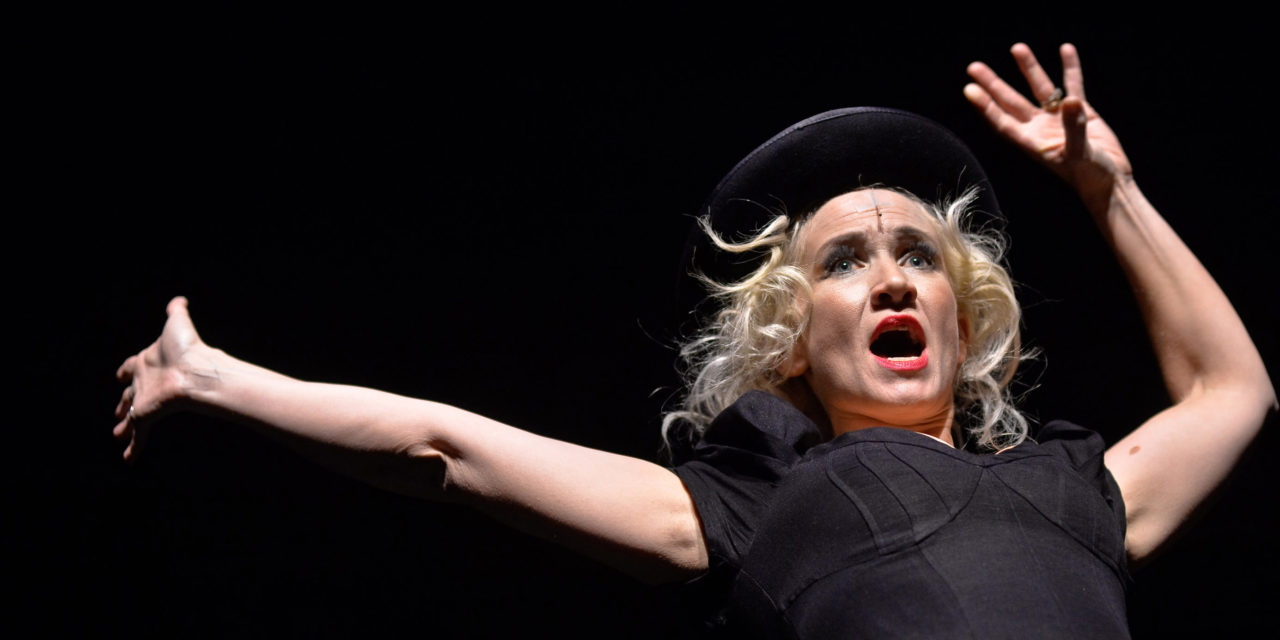
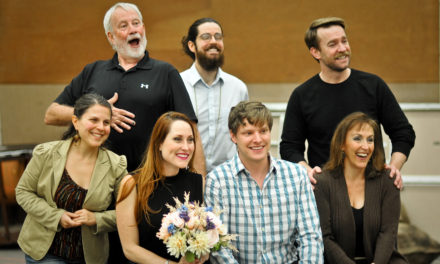

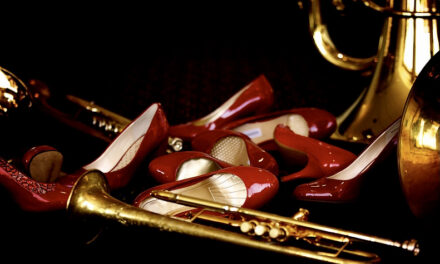
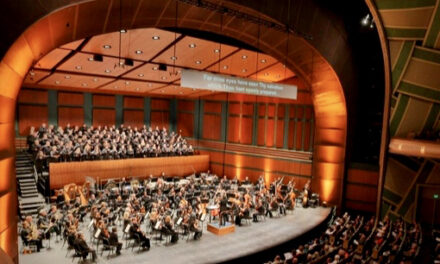







Daniel,
Thank you for a thorough, and enlightening review of our production of Seven Deadly Sins; something that doesn’t always happen with reviews in Eugene. If it’s possible for you to make an emendation of your test above, please not that the two pas de deux dances were performed by Jim Ballard and Adam Kelly along with Sara Stockwell in that order.
Thank you again,
Bill Hulings (stage direction and improbable mother in drag)